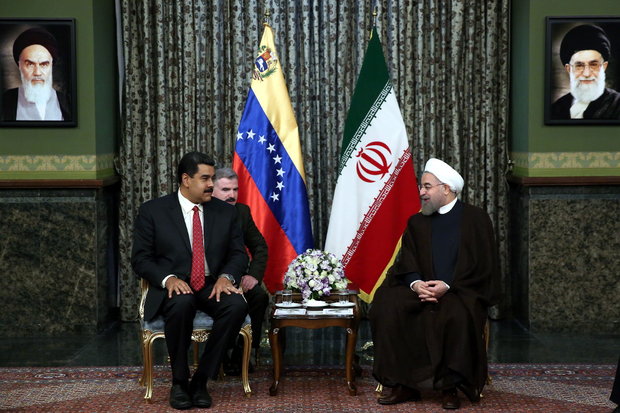The two countries have always forged amicable relations based on their aversion to colonial US policies and determination to preserve their independence.
Iran-Venezuela close relations also have paved the way for adopting common views towards global political and economic developments.
The Venezuelan president began his four-day visit to Saudi Arabia, Iran, Qatar and Azerbaijan on October 20 as a plunge in global oil prices has negatively affected his country's economy.
As part of his tour of various oil-producing countries to help stabilize the international oil market, Maduro traveled to Iran aimed at fostering economic and political relations between the two countries on October 22.
The Maduro's visit to Tehran occurred approximately a month after Iranian President Hassan Rouhani’s tour to Venezuela in mid-September.
On Sept 17, President Rouhani traveled to Venezuela to attend the summit of the Non-Aligned Movement (NAM) and hold separate talks with Maduro.
Iran who had the rotating presidency of NAM during 2012 to 2016, handed over the alliance presidency for a period of four years to Venezuela that enjoys the world's largest oil reserves.
While in Tehran, Maduro held talks with his Iranian counterpart and Supreme Leader of the Islamic Revolution Ayatollah Seyyed Ali Khamenei and discussed the ways for fostering all-out mutual cooperation.
Stabilizing Oil Market:
In a meeting with Maduro, President Rouhani said Iran would safeguard any measures aimed at stabilizing the oil market and cited coordination and technical cooperation among the Organization of Petroleum Exporting Countries (OPEC) and non-OPEC producers as crucial.
Touching upon the unique situation of Latin American countries, Venezuela, in particular in Iran's foreign policy, President Rouhani reiterated that Tehran attaches great importance to expansion of mutual relations with Caracas, adding Tehran supports the fair price and the equitable share of the producers in the oil market.
Citing terrorism as a global dilemma, President Rouhani emphasized the need for forging consultation with all countries aimed at tackling terrorism, reiterating that the instrumental use of terrorist groups by global powers would backfire.
Maduro, for his part, underscored that Caracas is keen on expanding its all-out ties with Tehran, calling for expansion of cooperation among the OPEC and non-OPEC producers, reiterated that a new mechanism should be considered for stabilizing the oil price.
US Invincibility Big Fault
Receiving Maduro, Ayatollah Khamenei underscored that it is a big mistake to think that the United States is undefeatable, adding that Washington is severely paralyzed and vulnerable in the region as a result of its repeated mistakes during the past 15 years.
'Rational resistance against the US and exercising prudence in facing its policies is certainly going to bring victory,' the Leader said.
Leader of the Islamic Revolution said Venezuela's influence on the anti-arrogance movements across Latin America points to the country's high potential, urging Caracas to exploit the potential while the country holds the rotating presidency of NAM.
'The West does not like the Non-Aligned Movement to make progress,' he said, adding: 'But independent countries should go against the will of the West, and if they manage to do this, the future sure enough is going to be better than the past.'
The Venezuelan President, on his part, praised Iran's robust resistance against the US hostilities.
'While the Iranian people are living in peace and security, many of the regional countries are overwhelmed with wars, divisions and vulnerabilities,' Madoru said.
Hailing Iran as an Emerging Power
Back in August, Maduro in a joint press conference following a meeting with visiting Foreign Minister Mohammad Javad Zarif in Caracas, described Iran as an emerging power across the globe, underscoring that the Islamic Republic employs its capacity to bring about peace for other nations.
Maduro added the Islamic Republic of Iran managed to resist foreign pressure and economic sanctions and now has turned into a role model for other countries.
Commenting on the late president Hugo Chavez’ viewpoints towards Iran, Maduro said the late Chavez had correctly predicted Iran's role as an emerging power in the 21st century both in the region and the entire world, underlining the need for strengthening all-out strategic ties with Tehran.
He added the Islamic Republic uses its power to promote peace, stability and development in other countries, unlike the US and Western states that take advantage of their influence to wage wars and loot the resources of other nations.
The Islamic Republic of Iran greatly values its relationship with Latin American nations, including Venezuela, and has put fostering relations with such countries on the agenda of its foreign policy.
Latin American countries are significant for Iran due to political and cultural commonalities and congruity at international organizations and circles, particularly NAM.
As long as Tehran is determined to preserve its flourishing relations with Venezuela, which is a legacy of the founder of Tehran-Caracas ties late Chavez, two nations could reinforce their ties through closer economic cooperation.
Iran as an emerging power in the world believes that the two countries enjoy vast warm and cordial ties, which are rooted in the resilience and pro-independence policies of both nations and the two sides should chase deeper, more strategic and more serious cooperation.
The Islamic Republic of Iran has such a position that it can pick its political friends and trade partners and does not have to cooperate with a specific country or region in the world.
Iran and Venezuela as the founders of OPEC, have always attached great importance to expansion of mutual cooperation and Caracas’ oil policies have been of great importance to Tehran and is in line with that of Iran’s.
Providing that Venezuela is considered as a large economic market for Iran, expansion of economic cooperation would serve the interests of the two nations.
As a result the Iranian enterprises can make use of their technical, engineering, financial and trade capacities in Venezuela in the positive atmosphere created after last year’s nuclear agreement between Iran and the 5+1 group of countries , known as the Joint Comprehensive Plan of Action (JCPOA).
